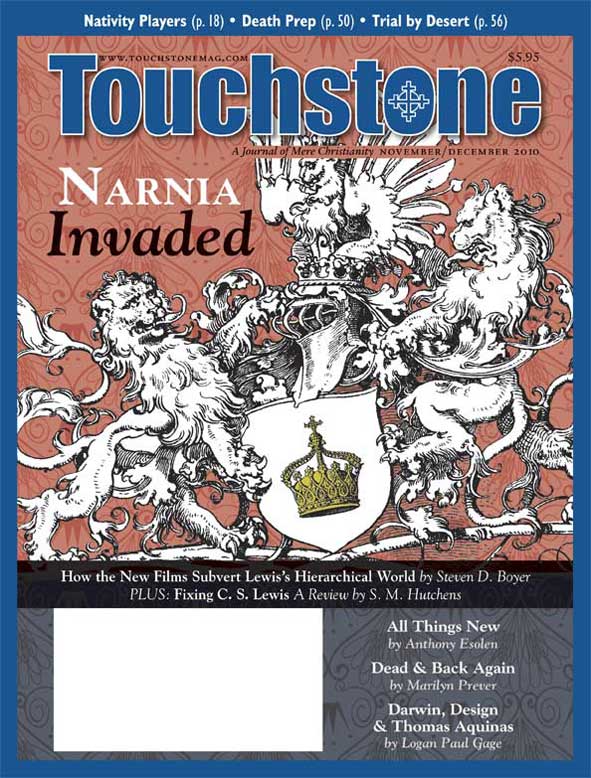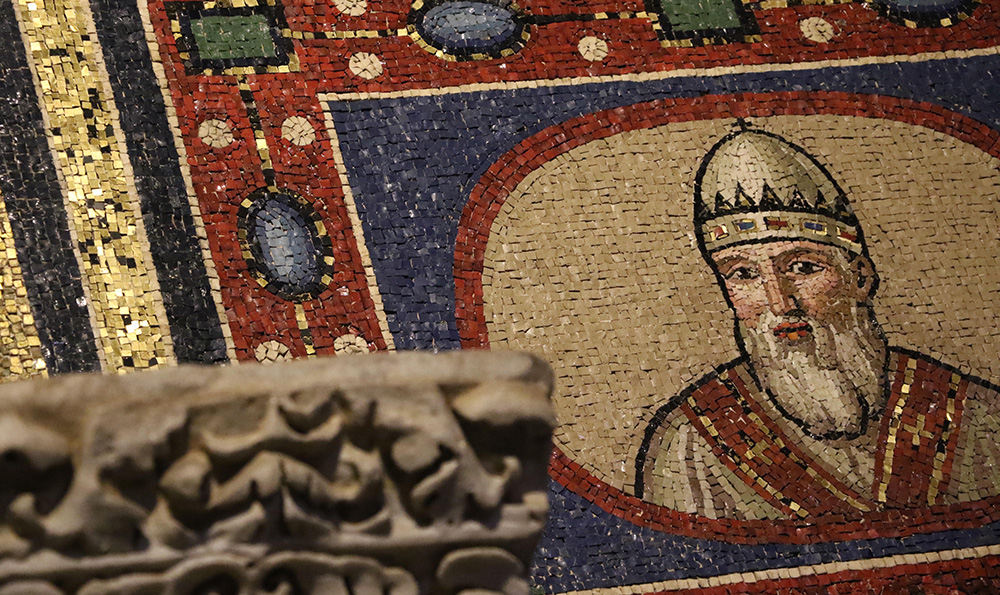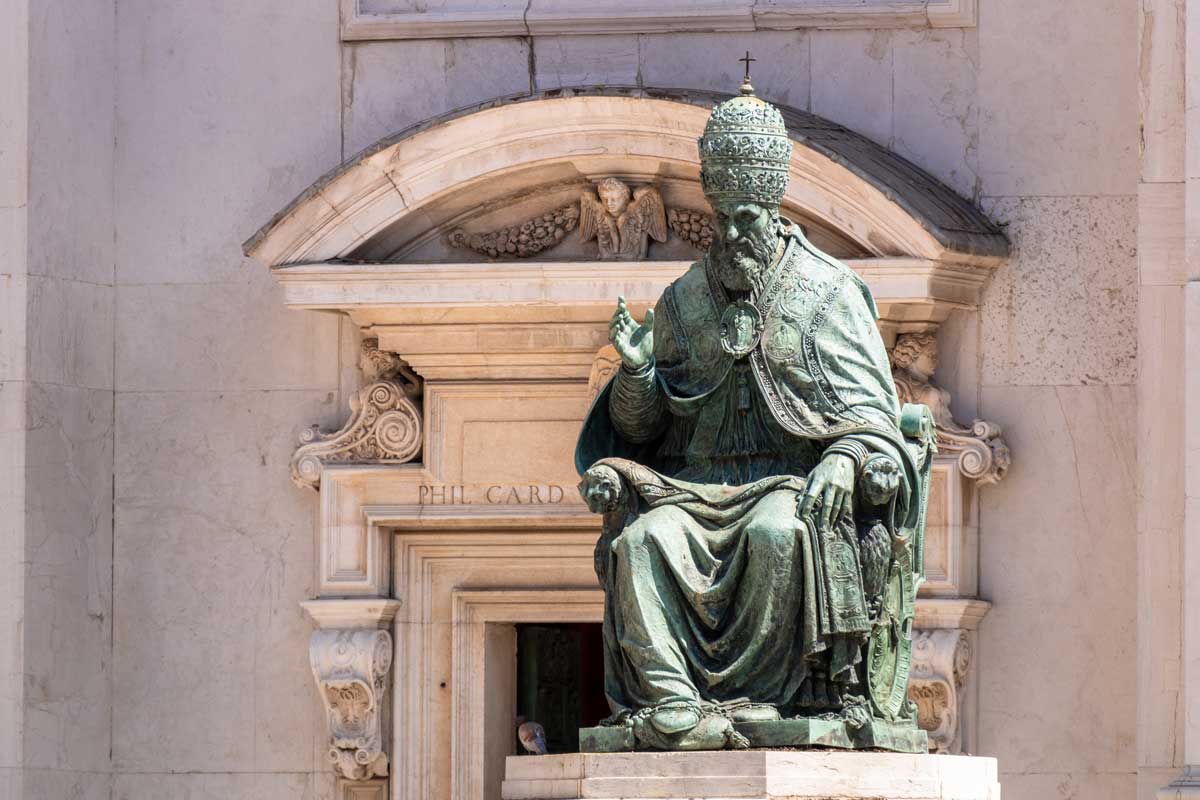Editorial
Between Caesar & Mohammed
Love of Enemies & Patriotic Duties
The Lord said, “You have heard it was said, ‘You shall love your neighbor and hate your enemy.’” This eminently practical precept, if not directly taught in Leviticus 19, may be inferred from it, and the “you have heard it was said” indicates that the inference was commonly made. What, indeed, will happen to people unable to develop sufficient moral leverage to hate their enemies? The interests of the peace which wars are fought to earn do not appear well-served by the teaching that we are to love our enemies and pray for those who persecute us. (The Lord did not say that fighting or killing them was outside the boundaries of love; indeed, the Father whose sons and agents we are, takes every life away in perfect love and justice.) As a practical matter, though, in the life and mind of the secular polis, the generation of lively hatred for the enemy, the hotter the better, is a necessity. That is why one “hears it said.”
This is not, however, the way of Christians. C. S. Lewis, a decorated veteran of trench warfare in France, demonstrated that Way in Mere Christianity:
I have often thought to myself how it would have been if, when I served in the First World War, I and some young German had killed each other simultaneously and found ourselves together a moment after death. I cannot imagine that either of us would have felt any resentment or even any embarrassment. I think we might have laughed over it.
It took no little courage for Lewis to say this during yet another terrible war with Germany. Organs of national propaganda have not found propagations like this helpful, especially during wartime: the Hun, the Bosch, the rapers-of-Belgium, and, in our day, fanatical Islamicism in its slavering odium for everything that resists absorption—one must admit these depictions as practical and politically necessary as what the hearers of Jesus had heard about their enemies.
The Christian Way
Love of the enemy, however, demands he be treated justly and fairly, that we do nothing to him that we wouldn’t have done to ourselves. This is the Christian way in the world, as much as it may anger and disturb those responsible for making wars in our name and for our sake—even wars Christians consider just and in which they willingly participate. David Mills recently observed in a private correspondence,
The passions that politics feeds—wrath, envy, resentment, excitement, etc.—drive many Christians far more than theological conviction. One change I’ve noticed lately is that religious conservatives have been shifting in the political issues they pursue from a religious to a secular or worldly viewpoint. They may be very devout, but what raises their heartbeat is not religion but politics.
The epinephrine to which David refers is comprised of very un-Christian passions like “wrath, envy, and resentment,” and we share his observations about the frequent failure of distinctively Christian thinking around political issues—a failure that may be extremely well camouflaged in a political conservatism that is far friendlier to Christianity than modern political liberalism.
Christians & Islam
The issue arose recently among us in a discussion of Christian treatment of Islam, a religion that has been from its beginning, and under the explicit direction of its Prophet, a bloody enemy of Christianity. We would be both naive and foolish to ignore the facts of its history or the consonance of its more radical and warlike teachers with the example of Mohammed and the precepts of the Qu’ran.
What are we to say, however, if Muslims tell us that, on the contrary, Islam is a religion of peace, that Islamic law is based on the same moral code as the Ten Commandments, and that Mohammed’s teachings are like those of Jesus? Is this to be treated as cynical misrepresentation of obvious facts for purposes of deception? No doubt for some representatives of Islam it is, but the Christian owes the Muslim the benefit of consideration of these things in accordance with his Lord’s rule that he should treat others as he would himself be treated.
Christianity regards the scriptures of no other faith except Judaism as inspired by God, so does not believe there exists an orthodox Islam based on correct interpretation of the Qu’ran. While Christians believe the Bible means what God intends it to mean, thus in truth and error in its interpretation, they can only regard a disputed meaning in the Qu’ran as a contest between Muslims that cannot be gotten behind, no matter how odd a Muslim conclusion may appear to a Christian.
From our perspective, Islam is not a religion of peace any more than its Prophet was a peaceful man or the Qu’ran a peaceful book. When, however, Muslims interpret the Qu’ran and the life of Mohammed in that way, act peacefully themselves—as many do—seek commonality in sharia and Torah and in the teachings of Jesus and Mohammed, if they find in it what Lewis referred to as the Tao, and which we believe leads to Christ—in fact, is Christ himself—should we seek cause against them rather than wish them well in pursuit of what is good?
We are bound as Christians to take these thing into account in understanding the phenomenon of Islam, and not assume that those who interpret it as essentially irenic, or reflective of a universal, divinely implanted ethic, are slyly misrepresenting it, even when provision is made in the Qu’ran itself for sly misrepresentation. That interpretation of their faith may look unlikely and unreasonable to us, but it cannot be said to be wrong in the same sense that tendentious exegesis of the Jewish or Christian Bible is wrong.
It is, moreover, difficult for Christians and Jews, if they are honest with themselves, to seize the high moral ground over Islam on account of its bellicosity, or because many of its laws are excessively sanguinary or unjust by modern Western (democratic and egalitarian) standards—unless, that is, the crusading God of the Hebrew Bible who shall in time cause the trumpets of the Apocalypse to sound is different from the one they worship in their churches. Our God is not only the God of peace, but also of war. It pains this writer when Christians condemn Muslims for understanding this about the nature of God, while they, serving at the altar of modern liberalism and in supine ignorance of their own Scriptures, ignore it.
Above & Apart
Christians must avoid having their judgment controlled by political enthusiasms, being especially careful of this when the political ideology to which they are drawn appears just, reasonable, and friendly to their faith. This is not a prescription against patriotism, nor does it mean that all political persuasions are created equal—far from it—but that the Church of Jesus Christ stands above and apart from every earthly institution and association in such a way that its members are continually responsible to discern, and to separate, what belongs to God and to Caesar. The idea of division between church and state was not invented by Jefferson for the Danbury Baptists, but taught by Christ to Peter; the question for Christians is on its nature, not its existence.
This is painful for those who love their native lands, and are thankful for them, but who in all times and places are called upon to acknowledge the priority of their citizenship in heaven. They must subordinate what state interest teaches them about their enemies—and other things—to the harder precepts enjoined upon them by their Master.
S. M. Hutchens is a senior editor and longtime writer for Touchstone.
subscription options
Order
Print/Online Subscription

Get six issues (one year) of Touchstone PLUS full online access including pdf downloads for only $39.95. That's only $3.34 per month!
Order
Online Only
Subscription

Get a one-year full-access subscription to the Touchstone online archives for only $19.95. That's only $1.66 per month!
bulk subscriptions
Order Touchstone subscriptions in bulk and save $10 per sub! Each subscription includes 6 issues of Touchstone plus full online access to touchstonemag.com—including archives, videos, and pdf downloads of recent issues for only $29.95 each! Great for churches or study groups.
Transactions will be processed on a secure server.
more from the online archives
calling all readers
Please Donate
"There are magazines worth reading but few worth saving . . . Touchstone is just such a magazine."
—Alice von Hildebrand
"Here we do not concede one square millimeter of territory to falsehood, folly, contemporary sentimentality, or fashion. We speak the truth, and let God be our judge. . . . Touchstone is the one committedly Christian conservative journal."
—Anthony Esolen, Touchstone senior editor









